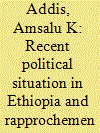|
|
|
Sort Order |
|
|
|
Items / Page
|
|
|
|
|
|
|
| Srl | Item |
| 1 |
ID:
180216


|
|
|
|
|
| Summary/Abstract |
Ethiopia is currently undergoing a significant political transition, a transition that began with the ascendency of Abiy Ahmed as a new chairman of the Ethiopian People’s Revolutionary Democratic Front (EPRDF) and Prime Minister of the country. In a span of a little over a year, bold political reforms have been introduced. At the same time, these reforms have exacerbated ethnic tensions in the country. In a country that has experimented with ethnic federalism and where ethnicity is the main political organizing principle, the pressure towards ethno-national political movements is quite strong. This pressure has transformed the political identity of many groups, including the Amhara. Despite its longtime role as a major constituency for pan-Ethiopianist movements, many Ethiopians claim that the Amhara, the second largest ethnic group in Ethiopia, has recently exhibited a trend towards ethnonationalism. In this paper we explore two questions. First, is there evidence that an Amhara nationalism is emerging? And if so, what may be causing this? Using recent data from both the Afrobarometer and World Values Survey, we find a growing sense of defensive Amhara nationalism among Amhara respondents, although there is no indication of a general abandonment of the “Ethiopianist (Ethiopiawinet)” ideal. We argue that this defensive nationalism is a product of a “security dilemma” dynamic facing the Amhara as the result of the continuation of the “Oppressor/Oppressed” narrative that has been adopted by the EPRDF regime. This ethnonational appeal resonates with young Amhara males, and those who believe that their group has been unfairly treated by the current regime.
|
|
|
|
|
|
|
|
|
|
|
|
|
|
|
|
| 2 |
ID:
173191


|
|
|
|
|
| Summary/Abstract |
This article is designed to provide an overview of the historical and contemporary relations between Ethiopia and Eritrea as well as to examine the recent geopolitical situation and the perception of local people in Ethiopia. This paper is mainly based on secondary data analysis of the available secondary information and news reports, online articles, academic literature, interviews and discussions. The Ethio-Eritrea war brought political, economic and social security threats to the Horn of Africa. Although the economy in Ethiopia is at the developing stage, recent protests have shaken the country to its core. Since 2015, anti-government protests have been triggered over freedom of the press, land rights, under-represented seats in the coalition parties, and horizontal inequality in economic, political and social affairs among ethnic groups across the country. In this study, it is established that the unrestrained political circumstance of the current regime has created dissension and violence among the public, and thus led to escalating political, economic and security crises in Ethiopia. If this issue is not rectified quickly, the peace in the country may be jeopardised. Another issue is that although Ethiopia-Eritrea rapprochement is appreciated, the agreement between both leaders and their foreign policy orientation is still unclear.
|
|
|
|
|
|
|
|
|
|
|
|
|
|
|
|
|
|
|
|
|